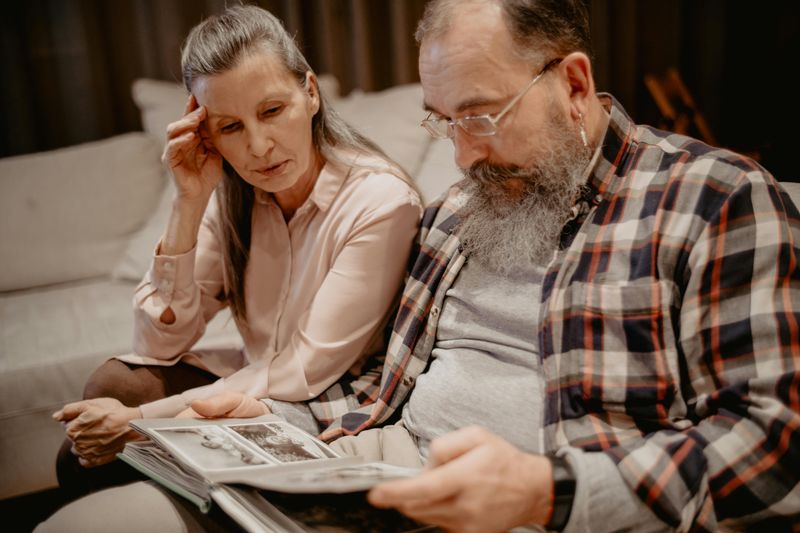Marriage remains a cornerstone institution in societies across the world, yet beliefs about married life are often shaped more by tradition and the media than by evidence. These deeply held myths can influence expectations and sometimes place avoidable strain on couples.
By examining these common misconceptions, partners can develop healthier and more realistic approaches to their relationships. This article explores twelve widespread marriage myths and offers explanations for each.
Understanding these myths does not reduce the value of marriage; rather, it allows individuals and couples to make informed choices based on reality rather than assumption.
1. Marriage Guarantees Lifelong Happiness

Can tying the knot truly promise a happy ending? Married people often report higher levels of satisfaction than single people, but this does not mean marriage itself creates happiness. The initial excitement of a wedding tends to fade as daily routines set in, and the quality of the relationship becomes the real driver of well-being.
Over time, factors such as emotional support, effective communication, and personal fulfilment become far more influential in determining marital satisfaction. A marriage certificate is not a guarantee but an opportunity to build an ongoing partnership.
Happiness in marriage comes from sustained effort and mutual understanding. Contentment requires patience, growth, and adaptability, rather than reliance on the institution alone. The relationship must be nurtured if it is to remain a lasting source of joy.
2. Conflict Means the Marriage Is in Trouble

Do arguments mean a relationship is failing? Many couples worry that disagreements signal trouble, yet this is not necessarily true. What matters is not the absence of conflict but how it is handled. Respectful dialogue and attempts at repair can strengthen bonds.
Avoiding conflict altogether may appear peaceful but often leads to suppressed frustration and distance. Couples who discuss their differences openly are more likely to feel connected and respected, even if they do not always agree.
It is the quality, not the frequency, of disagreements that matters most. Arguments handled with respect and care can create opportunities for deeper intimacy. Rather than being a sign of weakness, constructive conflict management is a valuable skill that helps partners weather challenges and maintain a resilient relationship over time.
3. Good Marriages Should Always Feel Romantic

What happens when the butterflies fade? Many imagine that lasting love should remain a whirlwind of romance, but most long-term couples move towards comfort and companionship. Passion often changes over the years, giving way to trust, security, and deeper connection.
This transition does not mean a relationship is failing. Instead, it reflects natural progression. Successful marriages often shift from dramatic expressions of affection to smaller, quieter moments of intimacy that are equally meaningful. Shared routines, humour, and mutual support frequently sustain couples more effectively than continual grand gestures.
Romance may ebb and flow, influenced by life stages, responsibilities, or stress. What sustains a marriage is loyalty, kindness, and emotional intimacy. Everyday affection, such as a thoughtful word or a shared laugh, can be just as important as romance, providing a steady foundation for a relationship that endures beyond the initial intensity.
4. Marriage Prevents Loneliness

Is a wedding ring protection against loneliness? While marriage can provide companionship, it is not a safeguard in itself. People in strained marriages often feel lonelier than single people who have strong social networks. Simply sharing a household does not ensure closeness if emotional connection is absent.
The key factor in preventing loneliness is the quality of emotional intimacy, not marital status. Partners who prioritise empathy, communication, and shared experiences tend to feel supported and understood, while those in distant relationships may struggle despite being married.
Strengthening connection requires deliberate effort. Shared activities, honest conversations, and attentiveness to each other’s emotional needs all contribute to a sense of belonging. Building this foundation takes time and commitment. Marriage may provide the framework for companionship, but genuine closeness must be created and maintained through consistent, intentional engagement.
5. Marriage Makes Finances Easier

Combining finances may seem straightforward, yet it often introduces as many challenges as benefits. While sharing resources can help with expenses and financial planning, differences in spending habits, debt levels, and long-term priorities frequently create tension. Money remains one of the leading sources of marital disagreement across cultures.
Financial harmony rarely happens automatically. Couples who approach money as a shared responsibility, through open discussions about budgeting, savings, and goals, are better able to avoid conflict. Transparency about debts and expectations is equally important, as secrecy or assumptions often erode trust.
When handled well, financial planning can become a shared strength rather than a source of division. By creating budgets together, setting clear expectations, and reviewing progress regularly, couples can reduce stress. Working as a team not only eases practical burdens but also fosters trust, helping money management to strengthen rather than strain the relationship.
6. Children Strengthen a Marriage Automatically

Having children is often seen as a natural step in marriage, bringing joy and meaning. However, the arrival of children frequently introduces stress. Common challenges include sleep deprivation, reduced couple time, and the need to prioritise childcare over personal or marital needs. These changes can place strain on even strong partnerships.
This dip in satisfaction is not inevitable but is widely reported, especially without sufficient support. Couples who share responsibilities equitably and communicate openly are more likely to maintain a strong bond. Involving extended family, friends, or childcare support can also ease pressure.
Parenthood can strengthen a marriage when approached as a team effort. Regular check-ins, appreciation for each other’s contributions, and deliberate time together as a couple help maintain intimacy. Children can enrich a relationship, but only when partners continue to nurture their own connection alongside their parenting roles.
7. Healthy Marriages Do Not Require Outside Support

A common belief is that strong couples should manage entirely on their own, but this assumption can be misleading. Even the healthiest marriages may face periods of stress or miscommunication. Relationship counselling, workshops, or community support provide valuable tools for strengthening communication and preventing problems from escalating.
Many couples seek help only when difficulties feel overwhelming. Yet, early support can be highly effective in preventing issues from becoming entrenched. Attending relationship workshops or accessing community programmes can offer new perspectives and strategies for managing challenges.
Seeking guidance should be seen as a sign of commitment rather than weakness. Making use of professional or community resources can reinforce resilience and connection, much like seeking expert advice in other areas of life. Healthy marriages are often those in which partners are open to learning and adapting together over time.
8. Marriage Is Becoming Obsolete

Is marriage outdated? Statistics may show declining rates or delayed marriages in many countries, but most people view marriage as meaningful. The institution is not disappearing but evolving.
Today, couples are more likely to marry later in life, often prioritising education, careers, or financial stability beforehand. Alternative partnerships, civil unions, and diverse family structures also reflect changing cultural attitudes. These shifts suggest adaptation rather than rejection.
Marriage still carries cultural, legal, and personal significance. It provides recognition, stability, and, for many, a sense of tradition or spirituality. What has changed is how individuals choose to engage with it, tailoring the institution to fit contemporary values and circumstances. Rather than becoming obsolete, marriage continues to adapt in ways that reflect broader social and economic transformations, maintaining its relevance in diverse forms.
9. Love Is Enough to Sustain a Marriage

Love is an important foundation for marriage, but it is not enough on its own. Successful marriages also require effective communication, shared values, and practical compatibility. Love may inspire commitment, but it cannot replace the skills needed to navigate challenges.
Commitment, adaptability, and cooperation all play major roles in long-term stability. Partners who invest in these areas, by compromising, resolving conflict constructively, and aligning goals, tend to experience more satisfaction. A relationship based solely on affection may falter when practical difficulties arise.
Love creates the motivation to stay connected, but teamwork sustains the bond. Successful marriages balance emotional closeness with practical partnership, ensuring that affection is supported by strong foundations. By building trust, resilience, and mutual respect, couples create conditions where love can flourish and endure, even through life’s inevitable ups and downs.
10. Happy Couples Do Everything Together

It is often assumed that happy couples spend all their time together, but this is not necessarily the case. While shared activities are important, maintaining individuality can actually strengthen a relationship. Couples who encourage one another’s independence often report higher satisfaction.
Spending time apart allows for personal growth and brings renewed energy into the relationship. Pursuing individual goals and hobbies helps partners maintain a sense of identity, which in turn enriches their partnership. By supporting both shared and separate pursuits, couples create a balanced dynamic.
A healthy marriage balances unity and individuality. Encouraging independence prevents feelings of suffocation or resentment and provides space for each partner to thrive. Rather than diminishing closeness, this balance often strengthens it, making the relationship more resilient and dynamic. Togetherness remains important, but it need not come at the expense of personal freedom or growth.
11. Marriage Is the Same Across Cultures

Marriage is not a uniform experience worldwide. Cultural traditions, religious practices, and legal systems shape the institution in unique ways. In some societies, marriage primarily represents an economic or family alliance, while in others it symbolises a personal or spiritual connection.
Even within a single country, traditions and expectations can differ dramatically between communities. These variations highlight the diversity of human relationships and caution against generalising based on one cultural perspective.
Understanding marriage requires sensitivity to cultural context. What appears to be the norm in one society may hold little relevance in another. Recognising these differences not only prevents misconceptions but also enriches appreciation for how marriage adapts to different values and circumstances. Rather than assuming a single narrative, acknowledging cultural diversity provides a more accurate and respectful understanding of the institution globally.
12. Staying Married Is Always the Best Option

Some assume that ending a marriage always represents failure, but this is not necessarily the case. For people in unsafe or persistently unhappy relationships, separation can improve well-being and, in some cases, benefit children. Longevity alone is not an accurate measure of marital success.
The decision to divorce is complex, particularly when children are involved. Children can thrive when removed from high-conflict households, especially when they receive consistent care and emotional support. Remaining in a hostile or unstable environment often causes more harm than separation itself.
Prioritising health, safety, and emotional stability is just as important as preserving the institution of marriage. Choosing to leave may be difficult, but for some it creates the opportunity for renewed well-being and healthier relationships in the future. Success in marriage should be defined by quality, not duration alone.